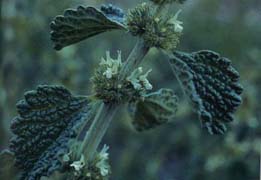User Login |
Plant StudyDamiana Family Name: TurneraFamily Name: Turneraceae Latin Name: Turnera diffusa, aphrodisiaca (Also Known As): Turnera microphylla, T. asiatica Common/Native Names: Damiana, damiane, oreganillo, the bourrique, Mexican damiana, Mexican holly, damiana de Guerrero, yerba del pastor, agüita de damiana, pastorcita(1)(3)(4) Related Species: Haplopappus disoideas, Chrysactinia mexicana (15) Body System Affiliations: 1. Nervous 2. Reproductive3. Urinary4. Hormonal5. Digestive (1)(5)
Botanical Description: Habit: small perennial shrub Size: 60 cm high Arrangement: AlternateLeaves: serrated with curved margins, 1-2.5 cm long, 6 mm wide, smooth, pale green on upper surface, glabrous with a few scattered hairs on underneath ribs, ovate-lanceolate, short-petioled, 2 ribs at base Flowers: small, yellow, solitary and axillaryFruit: small fruit, sweet smell, fig like flavor, globular, many-seeded capsule, which breaks up into 3 parts, aromatic and resinous (14)(15) Ecology:Habitat: Means the kind of conditions the plant likes, for example, moist forestunderstory; disturbed sites; wetlands, etc.Range: Gulf of Mexico, the Caribbean, southern Africa, southern U.S. (15)Native Where: Mexico, South and Central America, West Indies (13) Western (European-American) Uses/Relationships: Food: approved by FDA for food use and flavoring, made into a liquor thru out Mexico, liquor can be used in place of any other sweet liquor in dessert recipes (6)(10) Medicine: Part Used: aerial parts and leaves (1) Medicinal Actions: antidepressant, mild laxative and diuretic, reputed aphrodisiac, stimulant, testosterogenic, tonic, antispasmodic, antiseptic, tonic, emmenagogue, anti-anxiety, aperient, astringent, bitter, diuretic, expectorant, hormonal, nervine (1)(4) Indications: amaurosis, common cold, diabetes, dysentery, dysmenorrhea, dyspepsia, enuresis, headache, hormonal imbalance, infection, liver ailments, nervous depression, nervous disorders, pain, poor appetite, stomach ache (5) Body System Associations: Nervous, Reproductive, Urinary, Hormonal, Digestive Constituents: arbutin (up to 7%), volatile oil (including 10% delta-cadinene and 4% thymol), cyanogenic glycoside (tetraphyllin), resins (7%), gums, tannins (4%) (4) Applications: infusion, tincture, smoke, capsules (5)(6) Preparation: infusion: 1 tsp. damiana per 1 cup water.(11) Pharmacy: infusion: 1 cup three times a day; tincture: 1–3 ml is taken two or three times a day; capsule or tablet: 3–8 g twice a day (1)(6) Other: reputed magical qualities: fire element, masculine, of the planets mars and venus, powers of lust, love, visions, mineral association quartz, Wicca (a spirit recipe) 3 Tsp. Wormwood, 2 Tsp. Lavender, 1 Tsp. Dog Grass, 1 Tsp. Damiana, 1 Tsp. Hemp; APHRODISIAC TEA Cautions: minor laxative affect, may produce mild sense of euphoria if taken in large quanities, long term use may be toxic to liver, not recommended if you have gastrointestinal or kidney disorders, (3)(5) Indigenous and Non-Western Use/Significance/Relationships: Medicine: Indigenous Group: Northern MexicoPart Used: leaves Indications: nervous and muscular debilityPreparation: tea Medicine: Indigenous Group: Latin AmericaPart Used: leaves Indications: bed wetting Preparation: tea Medicine: Indigenous Group: Central AmericaPart Used: leaves Indications: poor sex drive Preparation: tea (11) Medicine: Indigenous Group: West IndiesPart Used: leaves Applications: discharge placenta after child birth (8) Cautions: do not use during pregnancy (8)
Propagation: Technique: seeds and cuttings Timing: outdoors if in the south or west, indoors for the north, sunny location, watered freely spring to fall, sparingly in winter, 55 F at night (16)
Harvest: Plant Part: leaves Season of Harvest: while plant is flowering Cautions: tops dried in shade without heat due to volatile (16)
Personal Experience:Food: made brownies replacing water with a Damiana infusion. Medicine:Part Used: leaves Desired Medicinal Actions: help regulate hormones Targeted Indications: hormonal balance Procurement: Source Radiance Condition Dried Cost $22/lb Application/Preparation/Pharmacy: Applications Infusion Preparation 1 tsp Damiana leaves soaked in 1 cup boiling waterPharmacy 1 cup in the morning upon rising before eating Reason/Purpose help in regulating hormonesExperience I tend to skip periods regularly. My period, which had been late, began the three days after taking the herb without many of the painful PMS symptoms I usually experience. Felt a little sluggish the first few days, but then began to have more energy than usual thru out the day.Cautions based on experience: It did mess with my blood sugar levels. The first few days I felt like I did when I was very hypoglycemic. I then started to eat small meals often and the feeling went away while still taking the Damiana infusion. Cautions: minor laxative affect, may produce mild sense of euphoria if taken in large quanities, long term use may be toxic to liver, not recommended if you have gastrointestinal or kidney disorders, (3)(5)
References Cited: Taylor, Leslie The Healing Power of Rainforest Herbs 2005. Online at http://www.rain-tree.com/damiana.htm Visited 2-11-20071. http://www.toadhollowbeads.com/THHerbsCh-E.htm Visited 2-12-20072. http://www.heartofthedragon.net/Damiana.htm Visited 2-12-20073. http://www.innvista.com/health/herbs/damiana.htm Visited 2-10-20074. http://www.holisticopia.com/herbage/files/H1458.htm Visited 2-12-20075. Davidson, Trish Gale Encyclopedia of Alternative Medicine, 2005 http://www.healthline.com/galecontent/damiana Visited 2-12-20076. Duke JA. CRC Handbook of Medicinal Herbs 1985, http://www.personalhealthzone.com/herbal_medicine/side_effects/damiana_side_effects.html Visited 2-12-20077. http://www.springboard4health.com/notebook/herbs_damiana.html Visited 2-12-20078. http://members.fortunecity.com/aspellortwo/ml-rec1.html Visited 2-13-20079. http://lomexicano.com/ Visited 2-13-2007. Info given in e-mail.10. Antol, Marie Nadine Healing Teas. Garden City Park, New York, Avery Publishing Group, 199611. http://www.planetbotanic.ca/fact_sheets/damiana_fs.htm Visited 2-13-200712. http://www.southwoodnursery.com/herbs.html Visited 2-13-200713. http://www.msnusers.com/TheWiccanHerbalist/herbalrecipesandformulas.msnw Visited 2-10-200714. http://www.rain-tree.com/damiana.htm Visited 2-13-200715. PDR of Herbal Medicines, June 2006 pNA16. http://www.textfiles.com/drugs/growhalu.txt Visited 2-13-2007 Alisa McDuff - Healing Gardens - Winter - 2007
Alisa McDuff
categories [ Other ]
login or register to post comments | printer friendly version
|
